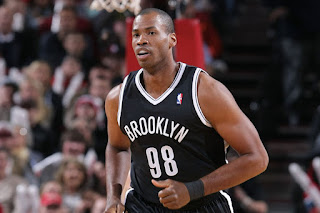February 23, 2014, 10 years ago: The Brooklyn Nets beat the Los Angeles Lakers, 108-102 at the Staples Center (now the Crypto.com Arena) in Los Angeles. Jason Collins played 10 minutes and 37 seconds for the Nets, and he didn't score any points. He did, however, have an offensive rebound, a defensive rebound, and a steal.
This appearance made Collins, who, in the off-season, publicly revealed that he is gay -- also known as "coming out of the closet," or "outing yourself," and was not, at the time, signed to any team -- the first openly gay athlete in major league sports in North America.
Presuming, of course, that you do not include MLS, Major League Soccer, as "major league." Robbie Rogers had already played for the Los Angeles Galaxy since coming out. So far, the reaction to him has been positive. But in the traditional "Big Four" North American sports, Collins was the first. And it appeared that, on that night, the L.A. fans -- presumably, many of whom have cheered Rogers -- treated Collins no worse than they treated any other opposing player.
A few other athletes have come out after retirement. Collins, knowing that he could still have a shot at signing with a new team, but also that teams might shy away from signing him if they knew, chose to be honest, and let them know. The Nets decided that it didn't matter, that it wasn't an indication of bad character, and that he might still be able to help them win, and they signed him.
Born on December 2, 1978 in Los Angeles, Collins was an All-American center at Stanford University. He had previously played with the New Jersey Nets from 2001 to 2008, before their 2012 move to Brooklyn. He played the 2nd half of the 2007-08 season with the Memphis Grizzlies, 2008-09 with the Minnesota Timberwolves, 2009-12 with the Atlanta Hawks, most of 2012-13 with the Boston Celtics, and the end of that season with the Washington Wizards. He ended up playing 22 games for the Nets, starting only 1, and never played again.
In that 1st game for the Nets, he wore Number 46. For his remaining games with the Nets, he wore 98, as he had with the Celtics and the Wizards. He wore it in memory of Matthew Shepard, a University of Wyoming student who was murdered for being gay in 1998. Having proven his point, he announced his retirement on November 19, 2014.
Glenn Burke, who played baseball in the 1970s, didn't "come out" while he was playing, because, in his own mind, he was never "in." Baseball fans at large didn't know he was gay, but his teammates knew, and most of them didn't care. Unfortunately, he played for 2 bigoted managers, Tommy Lasorda and Billy Martin. Lasorda ordered him traded away from the Los Angeles Dodgers; and Billy Martin, with the Oakland Athletics, had him sent down to the minors, burying him and prematurely ending his career.
One day, people who are gay will not have to face the choice of announcing it, or keeping themselves in the closet because they're afraid of repercussions. One day, we will hear that someone is gay, and we'll say, "So what? It doesn't make a difference. It's his (or her) business, not ours."
Until then, anyone facing the choice that Jason Collins and Robbie Rogers have made -- not being gay, but revealing it -- will need more Collinses and Rogerses, to move people's hearts and minds forward. Such people will advance our society in the same way that Jackie Robinson did on race, to the point where the only thing that matters is, "Can he play?"
If a player is a good player and a good teammate, then I don't care if he's a purple Buddhist from Mars in a ménage-a-trois with a college kid and a teddy bear: His personal life doesn't matter, and he can play on my team. If a player is exactly like I was as a young man, except with talent, but not enough to make it at the major league level, then I'd cut him.
I'd rather have a gay player on my team than an anti-gay player.


No comments:
Post a Comment